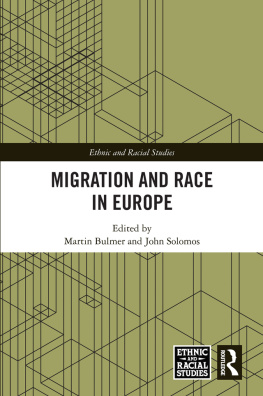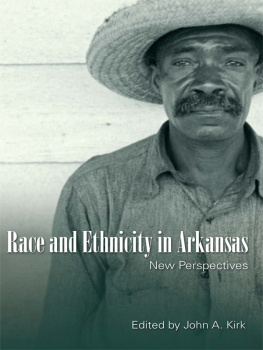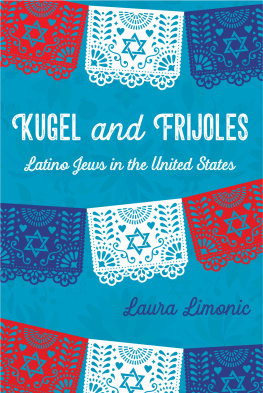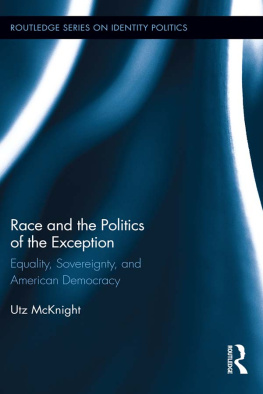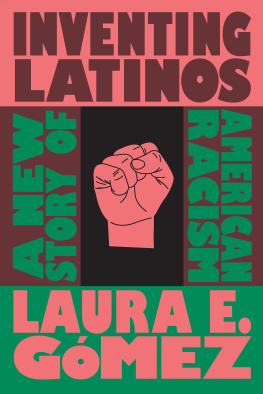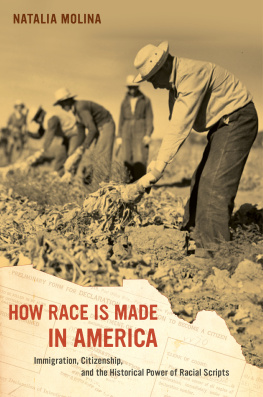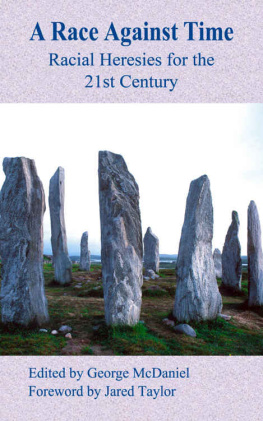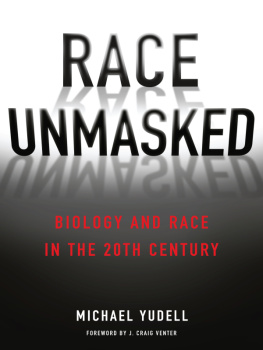Stanford University Press
Stanford, California
2012 by the Board of Trustees of the Leland Stanford Junior University. All rights reserved.
No part of this book may be reproduced or transmitted in any form or by any means, electronic or mechanical, including photocopying and recording, or in any information storage or retrieval system without the prior written permission of Stanford University Press.
Printed in the United States of America on acid-free, archival-quality paper
Library of Congress Cataloging-in-Publication Data
Roth, Wendy D., author.
Race migrations : Latinos and the cultural transformation of race / Wendy D. Roth.
pages cm
Includes bibliographical references and index.
ISBN 978-0-8047-7795-7 (cloth : alk. paper)ISBN 978-0-8047-7796-4 (pbk. : alk. paper)ISBN 9780804782531(e-book)
1. Hispanic AmericansRace identity. 2. Hispanic AmericansSocial conditions. 3. Dominican AmericansRace identity. 4. Puerto RicansRace identityUnited States. 5. RaceSocial aspectsUnited States. 6. United StatesEmigration and immigrationSocial aspects. 7. Dominican RepublicEmigration and immigrationSocial aspects. 8. Puerto RicoEmigration and immigrationSocial aspects. I. Title.
E184. S75R695 2012
305.868'073dc23
2011045213
Typeset by Bruce Lundquist in 10/14 Minion
Acknowledgments
As a native New Yorker, I am always a little surprised when people go out of their way to help me. I never expect to rely on the kindness of strangers, much less to experience significant acts of generosity at their hands. Conducting this research was a transformative experience in that sense. I was deeply touched by the amazing warmth and kindness of the people who helped me in many different ways, from opening their homes and sharing their experiences with me, to making practical suggestions about the fieldwork, to reading drafts of my work. This book could not have been written without those many acts of kindness.
I am particularly grateful for the guidance of Mary Waters. I am awed by her ability to see the big picture and to help me communicate it in my work. With her tremendous skill as a teacher, a presenter, and a researcher, she is a role model for the scholar I hope to be. More than this, she is a role model for the person I hope to be. I am indebted to her for her empathy, her compassion, and for illustrating how to be a superlative academic and a superlative human being at the same time. Peggy Levitt broadened my intellectual perspective and helped me rethink the theoretical foundations of my work. She was incredibly generous with her time, her contacts, and her ideas. Working with her was always a pleasure, and I have grown considerably under her guidance. Prudence Carter offered exactly the kind of direction a young scholar needs. She challenged me to push the envelope, and to develop my own voice. Her comments always helped me see the path more clearly and left me energized to improve my work. Kathy Newman amazes everyone with her motivation and unsurpassable mentorship. I consider myself especially fortunate to have benefited from that mentorship on so many projects. I have learned from her to be a better writer and a more ambitious scholar. I am also extremely grateful to those who read complete drafts of this work and provided invaluable guidance on how to frame and focus the material: Richard Alba, Nancy Foner, Neil Gross, Toms Jimnez, and Robert C. Smith, as well as the anonymous manuscript reviewers. My writing groupCatherine Lee, Ann Morning, and Alondra Nelsonwas a tremendous source of support, sanity, and good advice. Many of their suggestions improved this work immensely.
I owe a strong debt of gratitude to my research assistants: Carla Abreu, Laura Bauz, Edwin Marrero, Carmen Ortiz, Pedro Jos Perez Rivera, Angela Ramrez Guzmn, Nelida Iris Rivera, Cecilia Zambrano, and Amalia Zarranz. Their commitment, dedication, and patience in hunting down respondents and traveling to any corner of the city at a moments notice were truly exceptional. I am especially grateful to those who were my cultural tour guides as well as my assistants. I also want to thank the people who transcribed and translated the interviews: Michael Chiappa, Adrian Gmez, Mayobane Gmez, Sandy Jimnez, Robert Julian, Andrea Lawson, David Lebron, Marisela Morales, Stephanie Nieto, Kathy Paez, Enrique Prieto, and Lee Soto. I appreciate all your comments and reflections on the interviews, as well as your skill in your work. Thanks also to Alana Busby, Will Goldbloom, Xela Korda, and Miguel Angel Ruz Prez for their research assistance.
While in the Caribbean, I was fortunate to be a visiting scholar at two wonderful research institutes. I still feel a part of the family at the Instituto de Estudios del Caribe at the University of Puerto Rico in Rio Piedras. For this, I am exceptionally grateful to Pedro Rivera-Guzmn and to Ana Fabin, Delia Figueroa, Humberto Garca, Jorge Giovannetti, Vivian Iglesias, Juan Lus Martnez, Felix Ojeda, Minerva Prez, Mildred Santiago, and Ovideo Torres. A number of other scholars offered me advice and guidance during my time in Puerto Rico as well. I am particularly grateful to Jorge Duany for his suggestions, support, and ideas. I also want to thank Ineke Cunningham, Isar Godreau, David Hernndez, and Milagros Iturrondo. In Santo Domingo, I was fortunate to be welcomed at the Facultad Latinoamericana de Ciencias Sociales (FLACSO), where I received tremendous assistance from Eddy Tejeda and from Tracy Beck-Fenwick, Pilar Corporn, Duleidys Rodriguez Castro, Adrivel Ruiz, and Rubn Sili. I would also like to thank Agueda Bonilla, Thelma Camerena, Wilson Castillo, Dagoberto Ortiz Tejeda, Johanna Vidal, and Karin Weyland for their help and advice. I am also grateful to Brandy Case-Haub and the students at FLACSO for listening to my ideas and sharing their experiences with me.
In New York, I received invaluable assistance from Jennifer Holdaway, Philip Kasinitz, and John Mollenkopf at CUNY Graduate Center. Also from CUNY, I would like to thank Diana Hernndez, Joseph Pereira, Belkis Suazo-Garcia, and Rafael Torruella. Several other scholars took the time to talk with me and gave me useful advice and contacts. I am particularly grateful to Anthony de Jess, Ramona Hernndez, Solangel Maldonado, Nicole Marwell, and Sheridan Wigginton. I would also like to thank Wendy Morales for sharing her experience and insights.
Many other people helped me to locate respondents by referring me to potential candidates or spreading the word about my research as far as their networks would carry it. For this, I send my deepest thanks to Sacha Delgado at Instituto Internacional Euskalduna; Eduardo V. Genao of the Dominican Administrators of Schools; Jim McGowan at Centro de Lenguas y Cultura; Jos A. Santos at the Association of Dominican Engineers; Joe Semidei of the Committee for Hispanic Families and Children; the Professional Engineers Association of Puerto Rico; and all the members of the Dominican-American Professional Alliance, especially Winston Hernndez and Felix Sencin; Hector Bird-Lopez; Daisy Braverman; Victor Chen; Judy Gallo; Amy Kover; Ali Marin; Jo Ann and Bill Rosen; Miriam Shelef; and Tommy Taveras and Karen Wallman. I also want to thank the Dominican contingent at 270 Riverside Drive for giving me my earliest and most enduring taste of la dominicanidad: Leandro Cruz, Claudio Hernndez, Carlos Jimnez, Rodolfo Ovalles, and Tony Rivera.
My education in Puerto Rico and the Dominican Republic would not have been complete without the kindness of those who welcomed me and showed me different corners of their societies. I am thankful to Margarita Baguero de Reid, Omar Bautista Gonzlez, Jacqueline Bello, Alejandra Bird, Rosa Hernndez, Ana Teresa and Ani Martnez and their family, Blanca and Braulio Rodrguez, Lili Rodrguez, Sandy Rodrguez and Axel Berrios, Ida Salusky, Lincoln Sampong, Emily Schlotka and Beato Coronado, David Kearns Smith, Veronica Toro-Ruiz, Miguel Urdaneta, Sylvaria Vazquez and Edna, Arbuste Victor, and many others. I want to extend my deepest appreciation to Doa Milagros Polanco de Cabrera and Mariluz for providing me with a home away from home.


